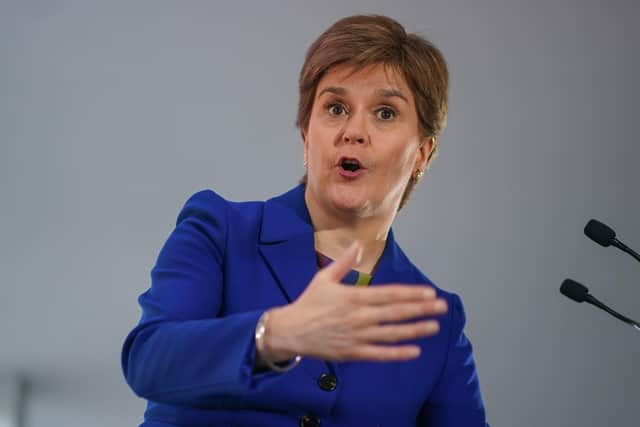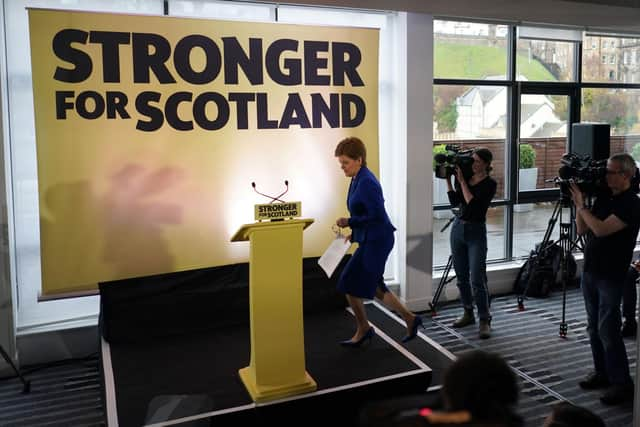Nicola Sturgeon speech: Scotland's First Minister reacts to Scottish Independence ruling from Supreme Court
and live on Freeview channel 276
Nicola Sturgeon gave a press conference after the Supreme Court announced the Scottish Parliament does not have the power to legislate for an independence referendum without Westminster’s permission. Speaking hours after the news was announced on Wednesday (November 23), Ms Sturgeon said: “While seeking Scottish Independence we will always be guided by democracy and by the rule of law. The route we take must be lawful and democratic for independence to be achieved. Achieving independence is not just desirable, it’s essential.”
She said any inadequacies in the law are down to the fault of Westminster, not the Supreme Court, adding that the decision has given “clarity”. Ms Sturgeon said: “This judgement raises profound and deeply uncomfortable questions” about the union, and the “voluntary” nature of the union.
Advertisement
Hide AdAdvertisement
Hide AdMs Sturgeon also said she believes the Scotland Act “shatters” the understanding that the union is a joining of voluntary nations. “First of all, it is worth repeating, that the court judgement refers to one possible route” she continued, saying that she will not go cap in hand to the UK Government to ask them to reconsider their decision on the referendum, though she still believes a referendum is the best way to decide Scotland’s future.


"Unless we give up on democracy...we must and we will find another democratic, lawful and constitutional means for how the Scottish people express their will."
This, the First Minister believes, will be done through an election. An election, where people vote for the SNP, will make it clear that Scotland wishes to leave the union, and this will be the basis rather than a referendum, claims Ms Sturgeon. She has confirmed that a special party conference will be called in the New Year to plan a de-facto referendum.
The First Minister said: "We should be in no doubt that as of today, democracy is at stake. This is no longer about whether Scotland can be independent...but whether we have the democratic right to choose our own future.”
Advertisement
Hide AdAdvertisement
Hide AdMs Sturgeon said that, although she understands there will be disappointment, it should be short lived. "The fact is, we have work to do. My resolve to achieve independence is as strong as it has ever been.”


What was the Supreme Court decision on Scottish Independence?
UK Supreme Court president Lord Reed announced the unanimous judgement after Scotland's top law officer referred a prospective Bill to the court. Lord Reed said: "The Scottish Parliament does not have the power to legislate for a referendum on Scottish independence."
Dorothy Bain KC had referred the Scottish Independence Referendum Bill to the court, seeking its decision on whether Holyrood had the competence to pass the legislation. The UK Government, which is opposed to a second vote on independence, said it is "obvious" that the Bill relates a matter reserved to Westminster.
Its legal representative, Sir James Eadie KC, also argued that the Bill was at too early a stage for the court to issue a ruling on. Lord Reed said he accepted the Lord Advocate's argument that it was in the public interest for the court to decide on the matter.
Advertisement
Hide AdAdvertisement
Hide AdReading out a summary of the judgement, he firstly said the court was not being asked to express "a view on the political question of whether Scotland should become an independent country". He said: "Its task is solely to interpret the relevant provisions of the Scotland Act and decide whether the proposed Bill would relate to reserved matters."
Lord Reed, who was part of a panel of five justices, said the Lord Advocate had argued the Bill did not relate to reserved matters as the referendum would not automatically bring about the end of the union. He said the court did not agree with this interpretation, saying a referendum would have "practical" as well as legal effects.
The Supreme Court president said: "A lawfully held referendum would have important political consequences relating to the union and the United Kingdom Parliament. "Its outcome would possess the authority, in a constitution and political culture founded upon democracy, of a democratic expression of the view of the Scottish electorate."
Additional reporting by PA.
Comment Guidelines
National World encourages reader discussion on our stories. User feedback, insights and back-and-forth exchanges add a rich layer of context to reporting. Please review our Community Guidelines before commenting.